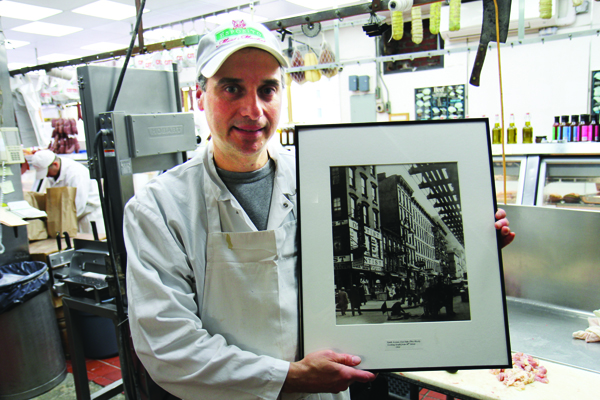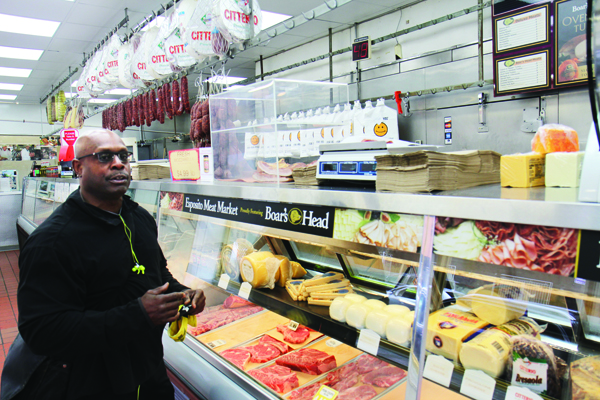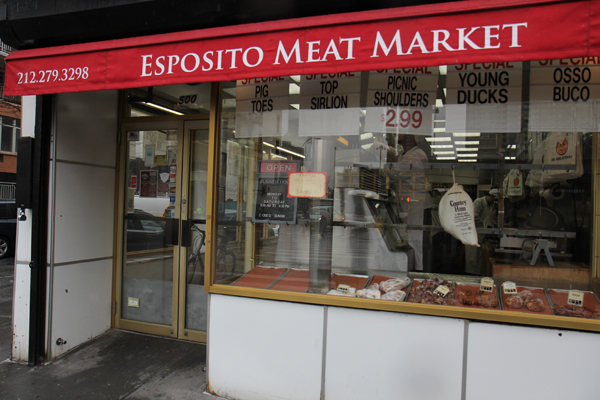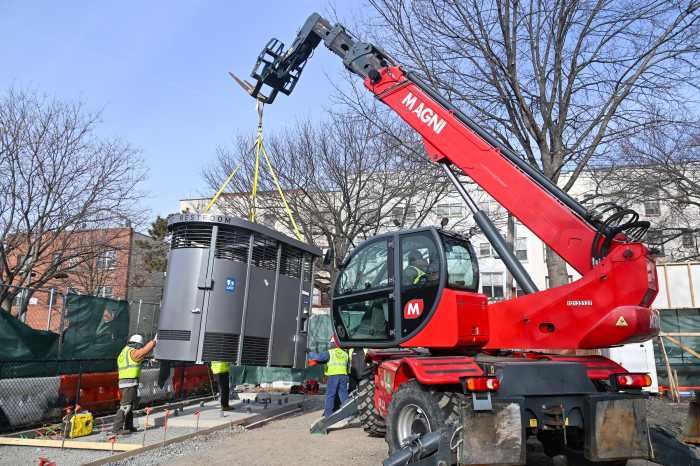
BY DENNIS LYNCH | Hell’s Kitchen has changed a lot over the last 100 years, but there’s one institution on West 38th Street that’s changed very little. Esposito Meat Market, at 500 Ninth Avenue on the corner of West 38th, a traditional Italian butcher shop run by the family from which it takes its name, is still sending locals home with cuts of the prime meats and a smile on their face.
Third-generation owner Robert Esposito said it’s that personal service as well as quality products that have kept people coming — and coming back — over the years.
“It’s the atmosphere of an old time butcher shop,” Esposito said. “We do one thing, the meats, no supermarket stuff. When going to an old-time shop, you get better quality and better service.”
You don’t have to take his word for it. Ask regular Curtis Jewell, who’s been a customer for two decades.
“It’s not like a supermarket where you’re just a number,” Jewell said. “They know you, they know your name, they know what you like, how to cut it for you, they do the right thing for you.”

Jewell is right — the butchers at Esposito have really gotten to know their customers. Many of them have been there for 10 to 15 years and the longest-serving employee has been there for 32 years, nearly as long as Robert himself.
“We try to treat everyone like family, our costumers and our employees,” Esposito said.
They were on a first-name basis with almost everyone who walked in during this reporter’s visit. Between shooting the breeze with Robert and the others while he waited for his order, Jewell planned a workout session with one before he left with his deli meats, ground beef, and sausages.
When Jewell first started coming to Esposito, Robert’s father Teddy was running the show behind the counter. He’s just a young man compared to some of the shop’s oldest customers. Robert mentioned an elderly woman named Olga who still comes down every month or so to stock up on meats; she’s been shopping there for 60 years.
The family has passed on the deed to the corner shop from generation to generation since Robert’s grandfather Giovanni first opened there just before the Great Depression hit, joining the dozens of butcher shops and meat markets that lined Ninth Avenue and made up Paddy’s Market. Giovanni was already a successful butcher, running his shop first on Mulberry Street and then on West 40th Street, before settling at the corner of 38th and Ninth. The construction of the Lincoln Tunnel access between Ninth and 10th Avenues killed Paddy’s Market, but Esposito endured.
It was never broken, so they never had to fix anything, and practices have largely stayed the same at Esposito even as the neighborhood and the customer base have constantly changed.

Giovanni used to sell a lot more “peasant’s food” — neckbones and tripe, for example — Robert said. Those cheaper cuts undoubtedly made their way into stews and soups eagerly consumed by hungry laborers who helped build this city. Who knows, maybe there was an Esposito sausage packed in the lunchbox of one of those workers captured in the iconic “Lunch Atop a Skyscraper” photo from 1932 — after all Rockefeller Center is only a dozen or so blocks away from the butcher shop.
Now customers ask for more prime cuts, such as shell steaks and ribeye steaks. They sell more chicken too. Regardless of demand, Esposito cuts everything in-house from sides and quarters of meat and stocks just about everything that comes off a cow, lamb, or chicken, so you can ask for any custom cut or peasant food you want.
Esposito’s in-house-made sausages are still the best-selling product, though. Esposito uses his traditional family recipe for many of them, but he’s gotten creative too, again to adapt to changing demands.
“Back then we’d sell sweet, hot, cheese, and parsley [sausages], now we sell like 20 different varieties,” he said. “Back then it was just pork sausage, now we have a line of chicken sausage — people wanted chicken sausage so we made chicken sausage.”
Esposito sources their all-natural, non-steroid meats from around the country — their pork and chicken come from Pennsylvania, lamb and veal from Colorado, and beef from Nebraska. Their veal and lamb are grass-fed and their beef certified Angus, but for now Esposito doesn’t have much in the way of certified organic meats. That’s not because he doesn’t want to, but because sourcing a side of organic beef or a quarter of lamb is difficult these days, Esposito said.
“All that organic stuff comes prepackaged from the farm, when you go to the supermarket and you see [organic] ground beef in the Cryovac package, that comes from wherever that farm is,” he said. “It’s a local farm, not big, and you can’t get wholesale. As more and more people ask for it, maybe it will come to the day when a butcher shop can get whole sides of it.”
Until then, Esposito will just have to survive on customer service and quality, which has certainly served this family business well so far.





































